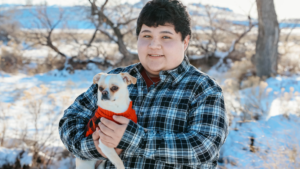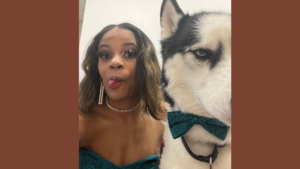Kimberly Karcz’s 23 years as a special education teacher have been filled with remarkable moments of growth, compassion, and the unwavering belief that every student can thrive when given the right support. As she applies for the Kerry Magro Special Education Teacher, Therapist and Aide Grant, run by KFM Making a Difference, Kimberly reflects on her journey of teaching students with autism, ADHD, and emotional disabilities in her specialized life skills classroom at Berner Middle School in Massapequa, New York. With her experience and dedication to fostering a supportive environment, Kimberly is constantly seeking ways to create meaningful opportunities for her students to grow academically, socially, and emotionally.
Kimberly teaches a 6:1:2 class, where she works with five students alongside a speech-language pathologist, four teaching assistants, and a health monitor. This small, close-knit team is integral to her approach, where flexibility, patience, and trust play pivotal roles in the learning process. “We are like a family,” she says, describing how they all work together to meet the unique needs of each student. Her students trust her and her team, and that trust has become the foundation for creating a learning environment where students feel comfortable and confident.
For Kimberly, the philosophy of “Teaching the Way Our Students Learn” is about more than just adapting lesson plans—it’s about building deep relationships with students and understanding the way they experience the world. In a special education classroom, especially one focused on life skills, the focus is often on meeting students where they are and providing them with the tools they need to succeed.
Kimberly recognizes that special education classrooms can look very different from mainstream ones. When people see her students in the hallway, some smile, while others may express confusion or fear. “Our key to learning is flexibility, patience, and trust,” she explains. This flexibility manifests in numerous ways, from adapting lessons on the fly to finding creative solutions when behaviors arise or students struggle to focus. For example, if a lesson plan isn’t resonating, Kimberly and her team have a backup ready to engage the students in a way that works for them.
A key element of this philosophy is the involvement of families. Kimberly always asks, “What could I teach your child that would make your life easier?” It’s a question that often surprises parents because it shows how deeply she values their input. Her students’ families are heavily involved, and Kimberly knows the importance of this collaboration in creating an environment where every child can succeed. The strong relationships she builds with families help ensure that the learning strategies used in the classroom extend into students’ lives outside of school, contributing to their overall development and well-being.
One of the most exciting projects Kimberly is working on is a “coffee cart” business for her students. The idea is to teach students essential life and work skills by running a small shop where they will serve coffee and tea to teachers. This initiative, which Kimberly plans to fund through the Kerry Magro Grant, will help her students learn real-world skills such as customer service, inventory management, and following a work schedule. “We want our students to be active members of the community,” Kimberly says. “The skills they learn from this project will help them gain independence and prepare them for future employment.”
Additionally, the coffee cart project will include shopping trips to purchase supplies, providing students with opportunities to practice budgeting, decision-making, and social skills. As the program expands, Kimberly hopes to involve more students and other classes in the school, further enriching the learning experience for everyone involved.
One of the most memorable and meaningful success stories in Kimberly’s teaching career centers around a student named “R,” who had been diagnosed with brain cancer as a young child. Following multiple surgeries and radiation treatments, R was diagnosed with a traumatic brain injury, and his cognitive abilities were significantly impacted. At 15 years old, R still struggled with reading, despite his best efforts. He could memorize spelling words for a week, but the following week, those words would be forgotten. R was fully aware of this challenge, and it deeply saddened him.
But there was one thing that R desperately wanted to do: read a book to a preschool class during a field trip/community service event. With this goal in mind, Kimberly and her team worked with R to help him memorize a rhyming book. They spent weeks practicing, with R tapping into his love for repetition and his strong desire to succeed. When the day of the field trip arrived, R proudly “read” the book to the preschoolers, following along with the words and pictures. His accomplishment was a testament to his hard work, determination, and the power of a supportive learning environment.
Unfortunately, a few weeks after this triumph, R’s cancer returned, and his condition worsened. Despite the heartbreaking circumstances, Kimberly continued to visit R and offer support, witnessing firsthand how much he had grown emotionally and socially during his time in her class.
Kimberly reflects on this experience as a reminder of the importance of teaching confidence over skills. “We, as special education teachers, often teach more than academic lessons—we teach confidence. Confidence is the key that helps students reach their full potential, no matter the challenges they face,” she shares. In R’s case, his success was not just about reading—it was about achieving something he had longed to do, and the pride he felt was far more important than the actual words he had memorized.
As Kimberly continues her work at Berner Middle School, she is committed to providing her students with the best opportunities to succeed, not just academically but as individuals who feel valued and capable. The Kerry Magro Special Education Teacher, Therapist, and Aide Grant represents an exciting opportunity for Kimberly to expand her classroom’s resources and continue fostering real-life skills in her students. The coffee cart project is just one example of how Kimberly is dedicated to empowering her students and preparing them for a future full of possibilities.
Through her work, Kimberly has proven that special education is about more than just academic instruction. It’s about building relationships, fostering trust, and helping students develop the confidence they need to navigate the world around them. With her unwavering dedication, Kimberly Karcz continues to make a lasting impact on the lives of her students, shaping their futures with patience, love, and a deep belief in their potential.
Have Dr. Kerry Magro give a student assembly, staff development for your educators or a parent talk for your parents by contacting him here for more details.
Follow my journey on Facebook, my Facebook Fan Page, Tiktok, Youtube & Instagram.
My name is Kerry Magro, a professional speaker and best-selling author who is also on the autism spectrum. I started the nonprofit KFM Making a Difference in 2011 to help students with autism receive scholarship aid to pursue post-secondary education. Help support me so I can continue to help students with autism go to college by making a tax-deductible donation to our nonprofit here.














